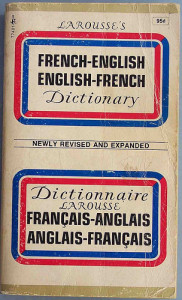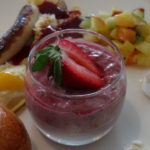This summer I’ve been studying in the first French class I’ve ever personally chosen to take. While it happens to be the case that a second language is a graduation requirement, notwithstanding this, I’m pretty jazzed about learning French, and being classified as a novice at a new language.
I’ve been merely an Anglophone my entire life, so perhaps people reading this will relate to some extent with the weirdness of trying to speak another language, and the particular tropes of beginning to learn one, particularly, that language of French.

Like vowels. French is a giant ocean of vowels, with many words ending and beginning (in the spoken form) with vowels. In the written form these vowel sounds are actually good old fashioned, Anglo-Saxon consonants, like for example, absolument, which is “absolutely” in French. This word is pronounced as if instead of ending in “ment” it ends with “maw”, and I continue to, after saying words like this, internally think of the letters not being said. While this phenomenon occurs in English as well, like with the word “thorough”, which I invariably pretend ends with an ugly grunting “gh” internally, in French every other word begins or ends or contains various silent letters. This makes the internal dialogue of the spoken French language a rather amusingly complex affair.
Then of course there is the rolling of the R. There are no words in English I can think of which roll the R, except imported words, which are, what do you know, imported usually from France. I am at a loss as to the practical significance, or the aesthetic importance, of rolling the R, as it seems to me as a decoration and extravagance. Why not say refrigerator? Rather than re-frig-e-ra-tor, with all it’s laborious splendour.
This phenomenon reappears in words which both languages spell the same – like the number six, or table, or the fruit orange – where the instructor, with a certain sense of how silly the request is, asks you to say them “in a French way”. It makes me wonder if there are any words imported from English, which are pronounced the same in French, or if everything if Frenchified.
As I am still in the middle of my course, the formation of questions can still sometimes slip me up. In French, one way of forming a question is to put the phrase “est-ce que” or “qu’est-ce que”, which to the novice I am, appears a very mystical phrase. This phrase turns a statement into a question, perhaps by magic, I’m not sure. The whole phrase can be ignored in informal conversation though, if you simply put an inflection on the question, like you would in English.

And finally, I will briefly comment on the rampant sexism in the French language. Everything is assigned a gender, and this gender changes the way you refer to the object. I’ve only just begun to learn (memorize) the genders of words, and I should say, the sex assignments are pretty hilarious. Radios, beer, cars, universities, and motorbikes are feminine, but regular bikes, beds, re-frig-e-ra-tors, and professors are all masculine. Additionally, entire nations are wholesale made either male or female, because of course, New Zealand is self-evidently a feminine word, and Brazil a masculine one (and so forth).
I’m sure I’m not alone in finding these peculiarities amusing. I await the day I’m proficient enough to forget, if for brief moments, these oddities like I do for the giant circus of exceptions and craziness in English, and think thoughts in this foreign language.






James says
I think learning a foreign language, any foreign language is an adventure…about the genders and their inevitable articles try German. Did you know that in German a girl is neuter (das Maedchen)?
The joys and frustrations of learning a foreign language.